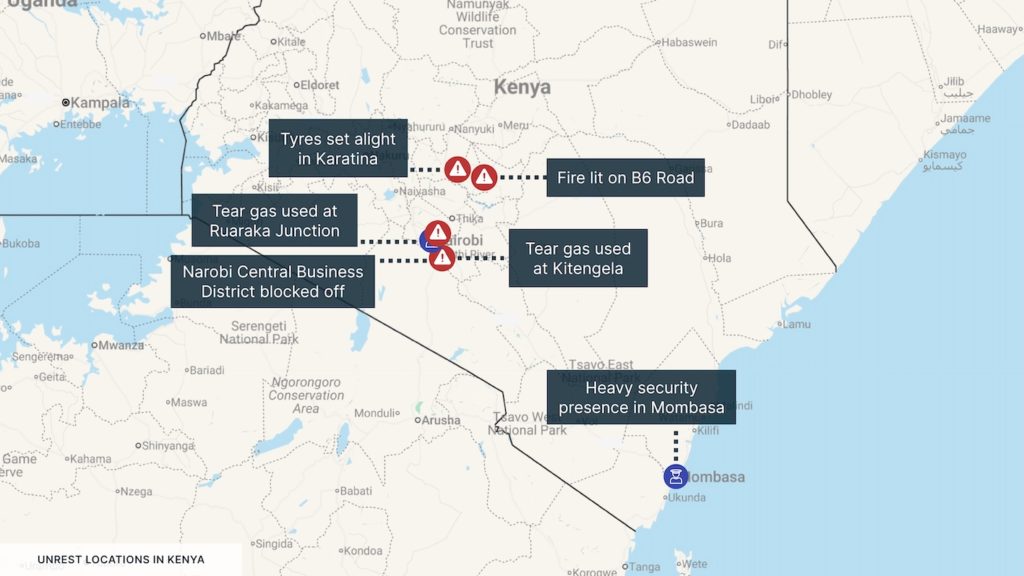Alert+
Evacuations from High-Risk Locations Call +44 (0)1202 308810 or Contact Us →
Road Disruptions Reported Across Kenya as Demonstrations Begin
Intelligence cut off: 11:00 BST 07 JULY 2025
Protests have reignited in Kenya, coinciding with the 7 July anniversary of the historic pro-democracy demonstrations known as Saba Saba Day. While today’s protests are in their early stages, violent incidents have already been reported. On the Nyeri-Nairobi highway in Karatina in Nyeri County, protesters have set tyres alight. Security forces have fired “warning shots” and tear gas to disperse a small group of protesters along Ruaraka Junction on Thika Road in Nairobi.
Local media have shared images of anti-government demonstrators lighting a fire to block traffic on the B6 road between Embu and Wang’uru in central Kenya’s Kirinyaga County. Police have utilised tear gas to disperse protesters in Kitengela.

Authorities had anticipated the protests and took pre-emptive measures by setting up roadblocks at several entry points to Nairobi’s Central Business District and blocking roads near the country’s parliament building with razor wire. A large police presence was also reported in Mombasa ahead of the planned demonstrations. Early morning commuters and overnight travellers were stuck at checkpoints, with security forces only letting some vehicles through.
Armed individuals have been accused of attacking protesters, with an armed group attacking the headquarters of a human rights NGO in Nairobi on 6 July. Civil society groups have claimed that they are colluding with security forces. The group reportedly consists of at least 25 individuals on motorbikes armed with clubs and stones. If they target protesters today, it will highly likely escalate the unrest and spark clashes between protesters and security forces.
INTELLIGENCE ANALYSIS
Demonstrators Mark Saba Saba Anniversary With Nationwide Protests
Anti-government protests have escalated following the death of blogger Albert Ojwang in police custody on 9 June. Today is the most significant day of unrest since 25 June, the first anniversary of the storming of parliament. Protests will almost certainly escalate throughout the day and into the evening, with demonstrators highly likely to clash with security forces.
Ahead of today’s protests, Cabinet Secretary for the Ministry of Interior and National Administration Onesimus Kipchumba Murkomen encouraged security forces to shoot on sight, something that will almost certainly exacerbate the civil unrest.
The 7 July Saba Saba (Seven Seven) Uprising in 1990 saw pro-democracy activists led by opposition figures rally against the rule of President Daniel arap Moi, who had been in power since 1978. The government banned the rally and violently cracked down on demonstrators, with security forces killing at least 20 people, arresting hundreds, and detaining opposition leaders without trial. In December 1991, Moi lifted the ban on opposition parties, enabling multiparty politics.
A notable distinction from the Saba Saba Uprising is that, while protests in the 1990s were led by opposition figures, the current demonstrations are a grassroots Gen Z movement led by students without defined leaders or ethnic affiliations.
The protesters have demanded good governance, greater accountability, and justice for victims of police brutality. The broad demands and lack of clear leadership will highly likely make it more difficult for protesters to pressure President William Ruto, who has weathered previous waves of protests since his election in September 2022, to resign. This, alongside the continued heavy-handedness by security forces, means that protests will likely continue beyond today.
Security checkpoints and protests have blocked major roads across Kenya. Continued travel disruptions around major cities, including Nairobi and Mombasa, are highly likely.
Travel Risk Advice for Kenya
- Avoid all non-essential travel to Kenya, particularly Nairobi and Mombasa.
- Avoid the central business district in Nairobi, as well as all major government buildings such as the Kenyan Parliament or the Governor’s Office.
- Closely monitor announcements from local authorities and media sources for any developments that may severely impact the local security environment.
- Avoid all areas of unrest due to incidental risks to bystanders. If caught in the unrest, travellers should move with the crowd until they find the nearest opportunity to escape. If in a vehicle, look to turn down the nearest road. If driving away is not an option, lock the vehicle and escape on foot.
- Always follow all instructions and orders from security forces. Where possible, avoid areas of active unrest and remain in a secure accommodation.
- Prolonged civil unrest can disrupt travel, especially if protesters begin targeting airports. Travellers should have contingency measures in place, including evacuation plans and reliable access to food, water and medication.
- Have emergency contact numbers saved on your phone. These should include the local authorities, medical facilities and any consular support. Ensure that mobile phones are charged in case of any loss of electricity.
- If caught in the vicinity of a security incident, seek shelter immediately and leave the area if safe to do so. Continue to adhere to all instructions issued by authorities and obey any security cordons in place.
- The overall security situation in Kenya, including Nairobi, is likely to remain severe in the coming days.
- Monitor the Solace Secure platform and trusted local media for updates relevant to the conflict.

Intelligence Lite
Free
- Weekly Intelligence Email with Key Events
- Alert+ Situation Summary for Immediate Incidents
- Quarterly Global Election Report (Lite Version)
- Yearly Global Risk Outlook (Lite Version)
Intelligence Plus
Full Subscription
- Weekly Global Intelligence (Full Report)
- Alert+ Reports (Summary and Full Analysis)
- Quarterly Live Q&A Webinar with Intelligence Team
- Quarterly Global Election Report (Full Report)
- Yearly Global Risk Outlook
- Ongoing Thematic & Regional Deep Dive Reports
- On-demand Pre-Travel Advisories (2 reports per year)
Subscribe to receive full reports
Join the thousands of risk management professionals that rely on our intelligence every week.
Includes 70+ reports written by expert analysts.
Subscribe